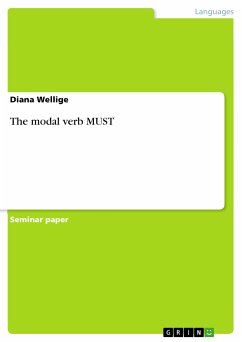Seminar paper from the year 2005 in the subject Didactics - English - Grammar, Style, Working Technique, grade: 1, University of Lüneburg, course: Grammar in context - Modal verbs, language: English, abstract: This paper deals with the task of modality, especially the modal verb must. The roots of modality can be found in the classical Greek philosophy. Modality “derived from the fact that human beings often categorize their attitudes and experience in terms of the way things might or must be, or might have been or must have been.” (Hoye, Leo (1997): Adverbs and modality in English. Harlow: Longman) So modal verbs are fundamental in everyday life, they are used in every conversation. With modals one can construct a possible world that differs from the actual world a lot.

